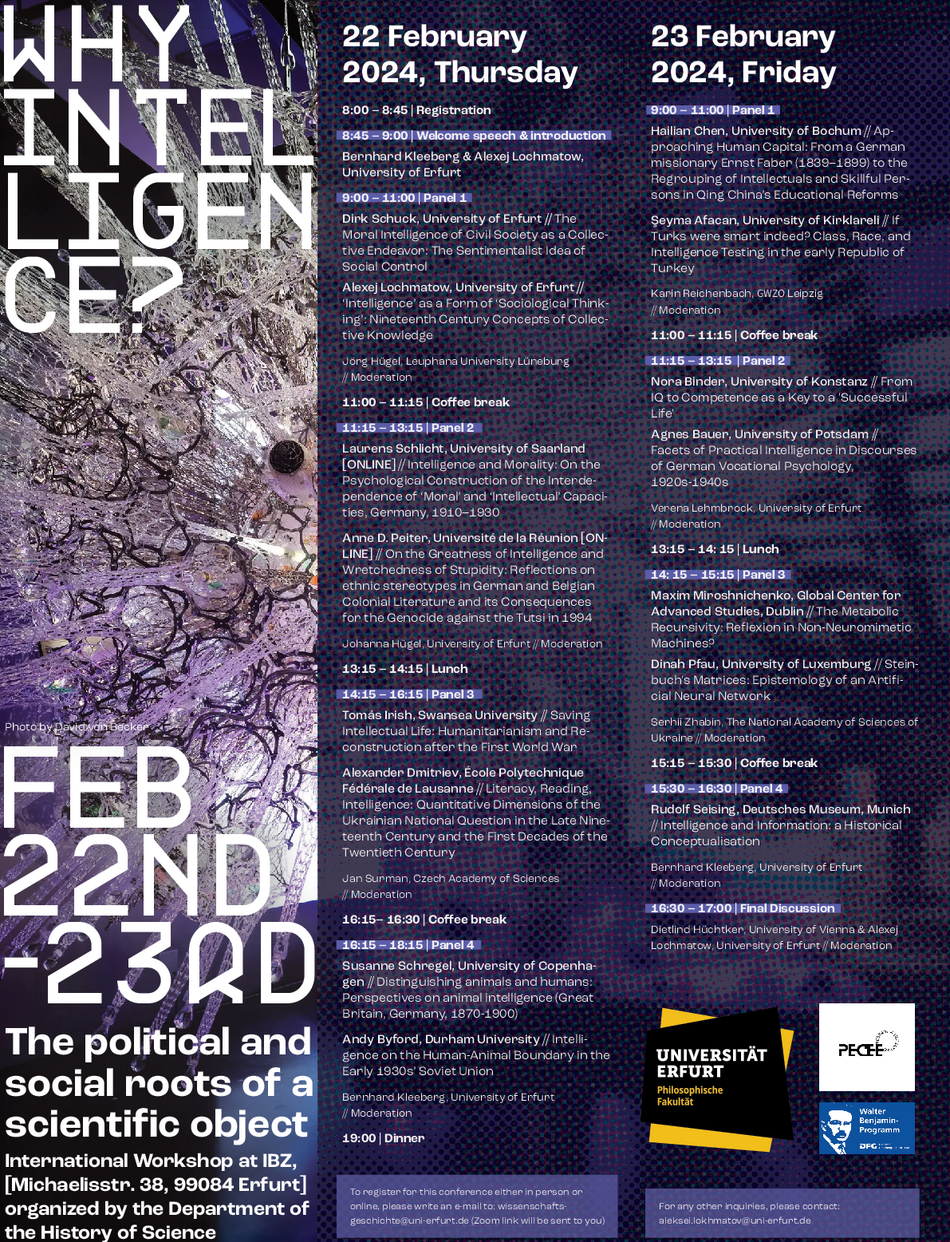The triumph of intelligence in the late 19th and early 20th century made it one of the most popular research subjects in the history of science. Artificial and swarm intelligence, the sociological critique of the ‘I.Q. ideology,’ the racism of intelligence research, and the role of the discourse on intelligence in popular culture have been the central issues in recent scholarship. Our workshop aims to change the focus of these debates. We intend to discuss not intelligence research itself but the social and political conditions that allowed intelligence to advance to its leading position in the scientific agenda, as well as the constellation of developments in both sciences and humanities that prepared its career. Our idea is to explore this phenomenon in relation to central ‘sociological’ categories such as social grouping, morality, stability, and normality. We will also examine how the scientific authority of intelligence influenced not only conservative, meritocratic, and racist discourses, but also socialist, anarchist and other social theories orientated towards social inclusion. Thus, the questions of social and political grouping rather than the traditional perspective of differential psychology will come to the fore in our discussion. We kindly invite you to join us in person or online!
Programm:
22 February 2024, Thursday
8:00 – 8:45
Anmeldung
8:45 – 9:00
Begrüßung:
Bernhard Kleeberg & Alexej Lochmatow (University of Erfurt)
9:00 – 11:00 Panel 1 // Moderation: Jörg Hügel (Leuphana Universität Lüneburg)
Dirk Schuck (University of Erfurt), The Moral Intelligence of Civil Society as a Collective Endeavor: The Sentimentalist Idea of Social Control
Alexej Lochmatow (University of Erfurt), ‘Intelligence’ as a Form of ‘Sociological Thinking’: Nineteenth Century Concepts of Collective Knowledge
11:00 – 11:15 Coffee break
11:15 – 13:15 Panel 2 // Moderation: Johanna Hügel (University of Erfurt)
Laurens Schlicht (University of Saarland) [ONLINE], Intelligence and Morality: On the Psychological Construction of the Interdependence of ‘Moral’ and ‘Intellectual’ Capacities, Germany, 1910–1930
Anne D. Peiter (Université de la Réunion) [ONLINE], On the Greatness of Intelligence and Wretchedness of Stupidity: Reflections on ethnic stereotypes in German and Belgian Colonial Literature and its Consequences for the Genocide against the Tutsi in 1994
13:15 – 14:15 Lunch
14:15 – 16:15 Panel 3 // Moderation: Jan Surman (Czech Academy of Sciences)
Tomás Irish (Swansea University), Saving Intellectual Life: Humanitarianism and Reconstruction after the First World War
Alexander Dmitriev (École Polytechnique Fédérale de Lausanne), Literacy, Reading, Intelligence: Quantitative Dimensions of the Ukrainian National Question in the Late Nineteenth Century and the First Decades of the Twentieth Century
16:15 – 16:30 Coffee break
16:30 – 18:30 Panel 4 // Moderation: Bernhard Kleeberg (University of Erfurt)
Susanne Schregel (University of Copenhagen), Distinguishing Animals and Humans: Perspectives on animal intelligence (Great Britain, Germany, 1870-1900)
Andy Byford (Durham University), Intelligence on the Human-Animal Boundary in the Early 1930s’ Soviet Union
19:00 Dinner (Restaurant ‚Nerly‘, Marktstraße 6, 99084 Erfurt)
23 February 2024, Friday
9:00 – 11:00 Panel 1 // Moderation: Karin Reichenbach (GWZO Leipzig)
Hailian Chen (University of Bochum), Approaching Human Capital: From a German missionary Ernst Faber (1839–1899) to the Regrouping of Intellectuals and Skillful Persons in Qing China’s Educational Reforms
Şeyma Afacan (University of Kirklareli), If Turks were smart indeed? Class, Race, and Intelligence Testing in the early Republic of Turkey
11:00 – 11:15 Coffee break
11:15 – 13:15 Panel 2 // Moderation: Verena Lehmbrock (University of Erfurt)
Nora Binder (University of Konstanz), From IQ to Competence as a Key to a 'Successful Life'
Agnes Bauer (University of Potsdam), Facets of Practical Intelligence in Discourses of German Vocational Psychology, 1920s-1940s
13:15 – 14:15 Lunch
14:15 – 15:15 Panel 3 // Moderation: Serhii Zhabin (National Academy of Sciences of Ukraine)
Maxim Miroshnichenko (Global Center for Advanced Studies, Dublin), The Metabolic Recursivity: Reflexion in Non-Neuromimetic Machines?
Dinah Pfau (University of Luxemburg), Steinbuch's Matrices: Epistemology of an Artificial Neural Network
15:15 – 15:30 Coffee break
15:30 – 16:30 Panel 4 // Moderation: Bernhard Kleeberg (University of Erfurt)
Rudolf Seising (Deutsches Museum, Munich), Intelligence and Information: A Historical Conceptualisation
16:30 – 17:00 Final Discussion // Moderation: Dietlind Hüchtker (University of Vienna) & Alexej Lochmatow (University of Erfurt)



